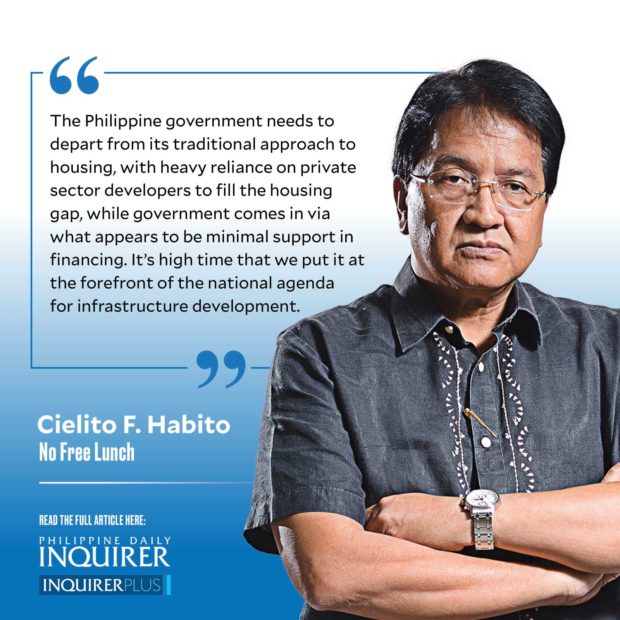A neglected basic human right
Give a family middle-class surroundings, and they begin to have middle-class dreams.” Gawad Kalinga founder Tony Meloto explained to me many years ago the rationale behind the colorfully painted houses that are the distinctive mark of their community-driven housing initiatives. His statement came back to mind years later when a Japanese colleague told me of a conversation he had with the little son of his Filipino driver. He asked the boy what he wanted to be when he grows up, and he told me how shocked he was at the boy’s ready reply, “I want to be a driver, like my father.” It will indeed be difficult to lift poor Filipinos out of poverty, he mused, if they cannot even aspire to achieve much more than what little they may have.
This should tell us how important and urgent it is that every Filipino family is provided decent housing. In the Sustainable Development Goals (SDGs) for 2030 committed to by the United Nations (UN), Goal 11 (out of 17) is to “make cities and human settlements inclusive, safe, resilient and sustainable.” Among its targets is to “ensure access for all to adequate, safe and affordable housing and basic services,” and upgrade slums to greatly reduce the “proportion of the urban population living in slums, informal settlements or inadequate housing.” While the United Nations emphasis appears to be on urban slums, in a disaster-prone country like ours, inadequate rural dwellings vulnerable to damage from typhoons and floods must be of equal concern, especially with poverty being more prevalent in our rural areas.
The reality is, the number of people living in slums worldwide actually rose from 807 million to 883 million over the period 2000 to 2014, according to UN statistics. The bulk of slum dwellers are in three regions: East and Southeast Asia (332 million), Central and South Asia (197 million), and sub-Saharan Africa (189 million). In the first region where we belong, the Philippines is certainly a major contributor to this statistic. One can surmise this from glaring statistics I cited recently from the Asian Development Bank on government spending on “housing and community amenities.” For this, 10.6 percent of the government budget is allocated in Malaysia, 6.2 percent in Myanmar, 5.2 percent in Brunei, 4.8 percent in Korea and Singapore, 2.7 percent in Indonesia, 1.7 percent in Japan, and 1.3 percent in Thailand and Bangladesh. In the Philippines, it is a miniscule 0.18 percent!
The Philippine government needs to depart from its traditional approach to housing, with heavy reliance on private sector developers to fill the housing gap, while government comes in via what appears to be minimal support in financing. In contrast, a recent Reuters article notes how the Singapore government, through its Housing Development Board, builds apartment units and sells them directly to citizens at highly subsidized prices on a 99-year lease. This has reportedly led to over 80 percent of Singaporeans owning their homes, one of the world’s highest rates. Given that our other neighbors spend proportionately much more on housing as well, it’s quite likely that their governments take a similar approach.
We are told that the new Department of Human Settlements and Urban Development has set a bold target of one million housing units every year—a tall order given the estimated current rate of 200,000-300,000 annual production. But we, indeed, need such bold targets in the face of a massive housing backlog, now estimated at 6.6 million units, implying that this is about the number of Filipino households living in inadequate and unsafe dwellings, using the SDG description. The Philippine Statistics Authority reported 26.4 million households in 2020, which means one in every four Filipino households is inadequately sheltered.
There has been much talk about hunger and malnutrition, especially in the wake of the pandemic. Decent and safe housing has not been talked and thought about as much. But shelter, like food and clothing, is one of the three basic human needs—and arguably a human right. It’s high time that we put it at the forefront of the national agenda for infrastructure development.
cielito.habito@gmail.com





















